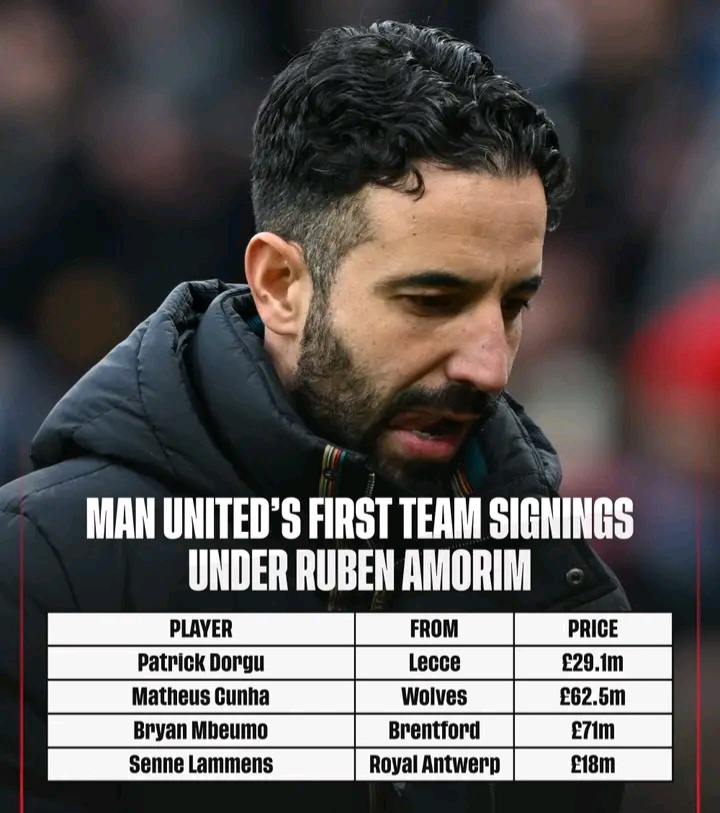Home
Man United have invested a huge £300 million in Ruben Amorim, yet the results are still nowhere to be seen.What could be the problem?

Manchester United’s struggles deepened with a 3-1 defeat away at Brentford, further increasing pressure on head coach Ruben Amorim. Goals from Igor Thiago and Mathias Jensen condemned United to another setback, despite Benjamin Sesko netting his first Premier League goal. The result came at a time when United were targeting consecutive league victories for the first time since May 2024.
Reports suggest United’s hierarchy are weighing up Amorim’s future, with results needing to improve by the October international break. The loss at Brentford has only intensified speculation, leaving questions about how much longer INEOS can afford to persist with their chosen manager.
Amorim was appointed in November 2024 as the first major decision under Sir Jim Ratcliffe’s INEOS regime, with Jason Wilcox and Omar Berrada also key to the process. Nearly a year on, United remain mired in inconsistency, with little evidence that Amorim’s vision has taken hold. The project, meant to signify a new era of stability and ambition, has instead brought more turbulence.
The financial backing Amorim has received makes his position even more contentious. United have spent close to £300 million under his leadership, with signings such as Benjamin Sesko (£74m), Bryan Mbeumo (£71m), Matheus Cunha (£62.5m), and Patrick Dorgu (£29.1m) brought in to suit his system. Yet despite heavy investment, performances on the pitch continue to falter, raising doubts about both Amorim’s methods and the judgment of those who appointed him.
Critics argue Amorim’s insistence on sticking with the same tactical model has backfired. While his approach flourished at Sporting Lisbon in the Portuguese league, it has struggled to translate in the Premier League, where opposition sides are stronger, deeper, and tactically refined. Instead of evolution, United have seen stagnation, with little sign that the manager is willing—or able—to adapt.
What keeps Amorim in place, for now, seems less about results and more about reputation. To dismiss him would reflect poorly on INEOS and their leadership team, casting doubt on Ratcliffe, Berrada, and Wilcox’s judgment after such significant investment. Gary Neville touched on this dilemma in his podcast, warning: “If Sunderland beat United, serious questions will be asked of the ownership. You can’t invest in a new system, a new coach, and then find yourself 15th—it’s not a one-off, it becomes who you are.”
Amorim’s immediate test comes against Sunderland, a match that could define his short-term future. A victory would buy him time over the international break and silence some of the noise surrounding his job. But failure would not only push United further into crisis—it would also turn the spotlight firmly onto INEOS, who may soon face the toughest questions of their tenure at Old Trafford.

 Sport12 months ago
Sport12 months ago“I’m not trying to criticize Ancelotti, but I’m not happy with him for benching that player”: Bellingham Expresses Frustration Over Ancelotti’s Tactical Decision

 Sport12 months ago
Sport12 months agoBREAKING: Manchester City vs Liverpool Clash Cancelled! Title Race Takes a Twist

 Sport12 months ago
Sport12 months agoArsenal Poised for January Swoop on €70 Million Star Dusan Vlahovic

 Sport12 months ago
Sport12 months agoWHAT ON GOD’S GREEN EARTH DID WE JUST SEE?!

 Sport12 months ago
Sport12 months agoReal Madrid: Carlo Ancelotti’s Surprising Revelations About an Unexpected Quality of Vinicius

 Sport12 months ago
Sport12 months agoBREAKING: Arsenal’s Champions League Quarterfinal Opponent Revealed After Monaco’s Dramatic Win – Tough Challenges Await Arteta’s Men

 Sport12 months ago
Sport12 months agoChelsea Players Facing Suspension as Yellow Cards Mount

 Sport12 months ago
Sport12 months agoKey Arsenal Player Set for Return as Gunners Face Struggling Everton
















